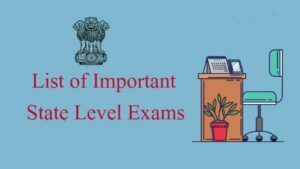In India, state exams refer to the various recruitment examinations conducted by state governments for filling vacancies in government departments, organizations, and institutions within their respective states. These state-level exams provide opportunities for individuals to secure government jobs at the state level. Each state conducts its own set of exams, tailored to the specific requirements of the state’s administrative, educational, healthcare, and other sectors. Here are some common types of state exams in India. Please note that this is not an exhaustive list, as each state may have its own set of exams based on its specific requirements and sectors:
Prominent State Exams
- State Public Service Commission (PSC) Exams:
- State Civil Services Examination
- State Police Services Examination
- State Forest Service Examination
- State Engineering Services Examination
- State Judicial Services Examination
- Teacher Eligibility Tests (TET):
- State Teacher Eligibility Test (STET)
- State Level Eligibility Test (SLET) for Lecturers
- Administrative Services Exams:
- State Administrative Services Examination
- State Revenue Services Examination
- State Municipal Services Examination
- Health Services Exams:
- State Medical Services Examination
- State Dental Services Examination
- State Nursing Services Examination
- Engineering Services Exams:
- State Engineering Services Examination (for various engineering disciplines)
- Agriculture and Horticulture Exams:
- State Agriculture Services Examination
- State Horticulture Services Examination
- Police Services Exams:
- State Police Constable Examination
- State Sub-Inspector Examination
- Judicial Services Exams:
- State Judicial Services Examination (for recruitment to the judiciary)
- Transport Department Exams:
- State Transport Services Examination (for various positions related to transport)
- Cooperative Services Exams:
- State Cooperative Services Examination (for various roles in cooperative societies)
- Fisheries Department Exams:
- State Fisheries Services Examination
- Social Welfare Department Exams:
- State Social Welfare Services Examination
- Panchayat Raj Department Exams:
- State Panchayat Raj Services Examination
- Tourism Department Exams:
- State Tourism Services Examination
- Rural Development Department Exams:
- State Rural Development Services Examination
- Animal Husbandry and Veterinary Services Exams:
- State Animal Husbandry Services Examination
- State Veterinary Services Examination
- Food and Civil Supplies Department Exams:
- State Food and Civil Supplies Services Examination
- Information and Technology Department Exams:
- State IT Services Examination
- Urban Development Department Exams:
- State Urban Development Services Examination
- Youth Services and Sports Department Exams:
- State Youth Services and Sports Examination
- Women and Child Development Department Exams:
- State Women and Child Development Services Examination
FAQ
Q1: What are state exams in India? A1: State exams in India refer to a variety of competitive examinations conducted by individual state governments to recruit candidates for various government job positions within that particular state.
Q2: What types of state exams are commonly conducted? A2: Common state exams include those for posts such as state civil services, police services, state government jobs, teacher recruitment, and various other departmental positions.
Q3: How can I find information about upcoming exams in my state? A3: You can typically find information about upcoming state exams by visiting the official website of your state’s public service commission or relevant government department. They often publish notifications and updates regarding exams and job vacancies.
Q4: What is the eligibility criteria for state exams? A4: Eligibility criteria vary depending on the specific state and the exam. Generally, candidates must meet educational qualifications, age limits, and sometimes domicile requirements as specified in the exam notification.
Q5: How can I prepare effectively for state exams? A5: Effective preparation involves understanding the exam syllabus, practicing previous year question papers, staying updated with current affairs, and possibly enrolling in coaching programs or online courses.
Q6: Are state exams competitive like UPSC or SSC exams? A6: Yes, state exams can be highly competitive, especially for prestigious positions like state civil services or police services. The level of competition varies from state to state and the popularity of the exam.
Q7: Are there any reservations or quotas in state exams for certain categories? A7: Yes, most state exams have reservations or quotas for categories such as Scheduled Castes (SC), Scheduled Tribes (ST), Other Backward Classes (OBC), and Economically Weaker Sections (EWS). These are intended to provide opportunities to underrepresented groups.
Q8: How is the selection process for state exams typically structured? A8: The selection process usually includes multiple stages, such as preliminary exams, main exams, interviews, and document verification. The specific process varies depending on the state and the type of exam.
Q9: Can candidates from other states apply for exams in a different state? A10: In most cases, state exams have eligibility criteria that may include domicile requirements. Candidates from other states may be eligible for some state exams, but it depends on the specific rules and regulations of each state.
Please note that the details and specific requirements of state exams can vary significantly from state to state. It is advisable to refer to the official notifications and websites of the respective state public service commissions or government departments for accurate and up-to-date information.
